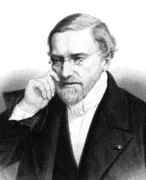Person: Poncelet, Jean Victor

Jean-Victor Poncelet was one of the founders of modern projective geometry. His development of the pole and polar lines associated with conics led to the principle of duality.
Mathematical Profile (Excerpt):
- It was a happy time for Poncelet, who showed great curiosity for all things around him, particularly a love of mechanical objects and he spent many happy hours playing with the mechanism of a clock which had been bought for him.
- When he was fifteen years old, Poncelet returned to Metz where he studied at the lycée taking the special classes designed to prepare students to take the entrance examinations for the École Normale and the École Polytechnique.
- Poncelet joined Napoleon's army of 600,000 men at the town of Vitepsk as it was approaching Russia.
- By 18 August the army was nearing Smolensk, the first genuinely Russian city, and Poncelet reconnoitred the city despite being under fire from the defending garrison.
- Poncelet spent five frustrating weeks with the army in Moscow, then on 19 October Napoleon ordered the army to withdraw.
- In his second chapter Poncelet attacks the problem of imaginary points in pure geometry with a courage and thoroughness ahead of anything shown by his predecessors.
- Later Poncelet allows, without careful definition, imaginary projections.
- A few days later Poncelet was released from Saratov prison but it took him until September of that year before he reached France.
- Poncelet then used his principle to show that if the point of intersection is considered to be outside the circle, one obtains the theorem that the product of the secants and their external segments are constant.
- No proof is required, Poncelet says, for one simply uses the Euclidean theorem and invokes his principle of continuity.
- It is worth remarking that our term "projective geometry" comes from the title of this book, which is quite appropriate since Poncelet was one of the founders of modern projective geometry simultaneously discovered by Joseph Gergonne.
- In particular Augustin-Louis Cauchy, writing a report on Poncelet's work on 5 June 1820, claimed that the principle of continuity was "capable of leading to manifest errors".
- This was not the only dispute that Poncelet was involved in.
- Articles appearing in Joseph Gergonne's Annales des Mathématique which used the principle of duality gave Poncelet little credit.
- It pushed Poncelet away from his work on projective geometry and towards mechanics.
- Poncelet declared: "After having reflected on this, it seemed to me that we could fulfil this double condition by replacing the straight blades on ordinary wheels with curved or cylindrical blades, presenting their concavity to the current." Thus, in 1823, Poncelet took the old undershot wheel and replaced its flat, radial blades with curved blades and angled its sluice gate to bring the water as close to the lower blades as possible.
- These ideas were published by Poncelet in 1826 and were awarded a prize by the French government.
- Poncelet was promoted to Chef de Bataillon in 1831, and then moved to Paris in 1834 when he was elected in March of that year to the mechanics section of the Académie des Sciences.
- Poncelet, as director of the École Polytechnique, led his students through the barricades to the Luxembourg Palace where they protected the Provisional Government.
- Louis Eugène Cavaignac, who had become French head of state and led the suppression of the revolt, honoured Poncelet for his support by appointing him to take command of the National Guards of the Department of the Seine.
- In 1849 Poncelet and Arthur Morin invented the dynamometer of rotation, which together with later refinements, became the basic investigative tool in the study of work.
- Poncelet was appointed as head of the Scientific Commission for the Exhibition.
- Poncelet also played an important role in this Exhibition.
- Poncelet published many articles on geometry and mechanics in addition to those we have mentioned, particularly in Gergonne's Annales des Mathématique and Crelle's Journal.
- Poncelet received many honours in addition to being elected to the Academy which we mentioned above.
- After a long and painful illness, Poncelet died in December 1867.
Born 1 July 1788, Metz, Lorraine, France. Died 22 December 1867, Paris, France.
View full biography at MacTutor
Tags relevant for this person:
Algebra, Geometry, Group Theory
Thank you to the contributors under CC BY-SA 4.0! 

- Github:
-

- non-Github:
- @J-J-O'Connor
- @E-F-Robertson
References
Adapted from other CC BY-SA 4.0 Sources:
- O’Connor, John J; Robertson, Edmund F: MacTutor History of Mathematics Archive
